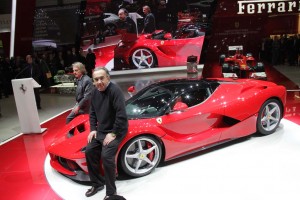
Fiat/Chrysler CEO Sergio Marchionne sits on a new LaFerrari during the supercar's Geneva preview. Ferrari Pres. Luca di Montezemelo is in the background.
Sergio Marchionne, the CEO of both Fiat and Chrysler, wants to finish merging the two companies as soon as possible – though other shareholders may make that a difficult task to complete without first taking the U.S. maker public.
During a news conference marking the first day of media previews at the Geneva Motor Show, meanwhile, Marchionne offered up a glum assessment for the worsening crisis the auto industry is facing in Europe, concluding he does not see a “glimmer of hope” for a turnaround in the market this year.
Shortly after Fiat took control of Chrysler, following the American maker’s emergence from bankruptcy in 2009, it appeared likely there would ultimately be a public stock offering. Marchionne has repeatedly delayed that move and now says he’d like to skip it entirely, telling reporters in Geneva “It’s the right thing to bring these two organizations together,” and suggesting Fiat has the “availability of funding to try and close this transaction” in short order.
Whether Chrysler’s other stockholder will agree is another matter entirely. The 41.5% stake that Fiat does not now own is in the hands of the United Auto Workers Union’s Retiree Medical Benefits Trust, generally referred to as a VEBA. The two sides have been in a debate over the value of the UAW’s holdings and the final decision is likely now up to a Chancery Court in Delaware, where Chrysler is registered, to decide.
Marchionne has said he’d still be willing to work out a settlement, and it is not clear how soon the judge will decide on the stock valuation, if necessary.
That ruling could create problems, according to some observers, if it sets the value too high. As it struggles in Europe to overcome the setbacks of the recession, Fiat is reportedly burning through significant cash, though Marchionne told reporters in Geneva “We’ve always been able to raise funds at reasonable rates,” if it becomes necessary to finance the merger with Chrysler.
“The plans remain unchanged” to merge the two companies, the executive stressed. If anything, it appears the European crisis is further encouraging the goal of “internationalizing” the joint manufacturing base.
In the end, Marchionne wants to freely link the global operations of Fiat and Chrysler, and focus on a handful of brands that can be sold around the world, emphasizing Jeep, Fiat and Alfa Romeo, along with the virtually autonomous Ferrari and Maserati.
The rationalization should improve economies of scale, the executive contends, and better utilize manufacturing operations.
Like its competitors, Fiat is struggling in Europe. The market slipped by roughly 1 million units last year, to its lowest level since 1996. And it is now plunging even faster than already gloomy analysts had predicted for 2013. On Tuesday, Renault/Nissan CEO Carlos Ghosn said that at the current rate, the market could slide another 5% to 8% this year.
(Ghosn frets it could take “years” to revive the European car market. Click Here.)
For his part, Marchionne clearly agrees. He told reports “I don’t see any glimmer of hope this year,” adding his expectation for a particularly “rough” first quarter.
Both Marchionne and Ghosn warned that political uncertainty – and the subsequent instability among consumers – is further weakening the European economy.

Marchionne will do as other buyers of Chrysler in the past have done…strip the assets and then try to sell the company once the Fiat models with Chrysler name plates, fizzles in the U.S., again.